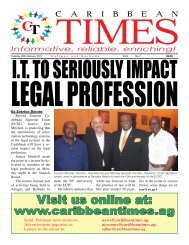Caribbean Times 89th Issue - Friday 9th September 2016
Caribbean Times 89th Issue - Friday 9th September 2016
Caribbean Times 89th Issue - Friday 9th September 2016
You also want an ePaper? Increase the reach of your titles
YUMPU automatically turns print PDFs into web optimized ePapers that Google loves.
<strong>Friday</strong> <strong>9th</strong> <strong>September</strong> <strong>2016</strong> c a r i b b e a n t i m e s . a g 13<br />
Do accredited universities<br />
give out honorary degrees?<br />
By ABNAB<br />
There have been many questions<br />
raised about honorary degrees with<br />
many persons wondering if accredited<br />
universities issue such awards.<br />
Yes, many accredited universities<br />
chose to award honorary degrees; honorary<br />
doctorates in particular. It is important<br />
to remember however, that the<br />
award is, as the name implies, an honorary<br />
one.<br />
The recipient did not qualify for the<br />
award by passing any prescribed examinations<br />
and in fact might not have<br />
even attended that particular university.<br />
Traditionally, universities have used<br />
the award to honor outstanding members<br />
of the community who have made<br />
significant contributions to society in<br />
their particular field of endeavor.<br />
Awards are also given to persons<br />
whose lifetime achievements have impacted<br />
the lives of many individuals. It<br />
is awarded as a mark of esteem – for<br />
the cause of honor or honoris causa<br />
(Latin).<br />
Persons are often confused when<br />
addressing someone with an honorary<br />
doctorate. Universities establish their<br />
own criteria for the award of honorary<br />
doctorates and have their own specific<br />
guidelines concerning the use of the title<br />
‘Dr’.<br />
Some allow the recipient to use the<br />
title generally, while others specify that<br />
it be used only within the circles of that<br />
particular educational community.<br />
Others may require that whenever<br />
the title ‘Dr’ is written in reference to<br />
a recipient of an honorary doctorate the<br />
abbreviation for honoris causa (h.c.) be<br />
written next to it.<br />
An honorary doctorate awarded by<br />
an accredited university, while obviously<br />
not having the same standing as<br />
an earned degree, can be regarded as a<br />
prestigious award.<br />
Regrettably, many “Diploma Mills”<br />
also offer honorary doctorates and<br />
therefore create skepticism about the<br />
value of such awards.<br />
cont’d from pg 12<br />
form of the US Treasury<br />
ostensibly to prevent a US<br />
company from being taxed<br />
unjustly by the EU since it<br />
went into Ireland on the basis<br />
of a declared tax structure<br />
and administration.<br />
The US government has<br />
warned the EU that any attempt<br />
to collect alleged unpaid<br />
back taxes not only<br />
from Apple but also from<br />
two other US companies,<br />
Starbucks and Amazon,<br />
would be overstepping its<br />
powers, making it ‘a supranational<br />
tax authority’.<br />
This last statement is especially<br />
interesting given<br />
that the US has long applied<br />
extra-territorial laws in pursuit<br />
of its own interests, and<br />
its 2010 Federal law, the Foreign<br />
Account Tax Compliance<br />
Act (FATCA), enforces<br />
the requirement for United<br />
States persons including<br />
those living outside the US<br />
to file yearly reports on their<br />
non-U.S. financial accounts<br />
to the Financial Crimes Enforcement<br />
Network.<br />
Governments are required<br />
to sign an Inter-Governmental<br />
Agreement with<br />
the US to make FATCA operational<br />
or the financial institutions<br />
in their countries<br />
will suffer significant financial<br />
repercussions.<br />
The US Treasury intervention,<br />
although it is<br />
couched in language that<br />
calls for the preservation of<br />
certainty and clarity in tax<br />
administration from the EU,<br />
really goes beyond that.<br />
It is really concerned<br />
with collecting taxes from<br />
companies, such as Apple<br />
and others, that are required<br />
to pay their taxes in the US.<br />
While under double-taxation<br />
agreements, companies<br />
can offset US taxes<br />
against taxes paid in an EU<br />
country, if the EU proceeds<br />
to demand US$19 billion in<br />
alleged unpaid taxes from<br />
Apple, the US share of taxes<br />
from the company would be<br />
considerably diminished - if<br />
there is any tax left to collect<br />
at all.<br />
So, in the end, this confrontation<br />
between two allies<br />
in the tax campaigns<br />
against everyone else boils<br />
down to money. Essentially,<br />
to whether the US or the EU<br />
gets the bulk of the taxes.<br />
And, then there is another<br />
consideration: a US Treasury<br />
White Paper says that<br />
the EU’s demand for retroactive<br />
tax payments “sets an<br />
undesirable precedent that<br />
could lead other tax authorities,<br />
particularly those in developing<br />
countries, to seek<br />
large and punitive retroactive<br />
recoveries from both US<br />
and EU companies”. And,<br />
of course, that must never be<br />
allowed to happen.<br />
In any event, a battle<br />
seems to be set up between<br />
the EU and US on harmful<br />
tax competition. Dwarves<br />
have been forced to capitulate<br />
in similar fights; it will<br />
be interesting to see how the<br />
giants fare against each other.<br />
Editor’s Note: The opinions<br />
expressed in this Op-ed<br />
are those of the author and<br />
do not necessarily reflect the<br />
views of <strong>Caribbean</strong> <strong>Times</strong>.

















